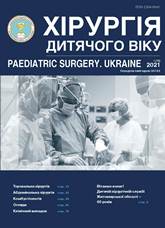Adhesive intestinal obstruction as a complication of Meckel’s diverticulum in children
DOI:
https://doi.org/10.15574/PS.2021.70.107Keywords:
children, Meckel’s diverticulum, complications, adhesive intestinal obstructionAbstract
Meckel’s diverticulum (DM) is a formation of the ileum caused by incomplete obliteration of the omphalomesenteric duct in the developing embryo. This is one of the most common anomalies of the digestive tract in children. Most DM develops completely asymptomatically. Clinical symptoms develop in only 16% of cases, and 50–60% of them are children under 10 years, an average of 2.5 years of age. The severity of clinical symptoms in DM is associated with the development of complications: intestinal bleeding, intestinal obstruction (intussusception, strangulation intestinal obstruction), diverticulitis with perforation and peritonitis, etc.
The article presents a clinical case of adhesive intestinal obstruction in an 8-year-old, which occurred after DM in the anamnesis. As the adhesive intestinal obstruction is an extremely rare complication of DM in children, the presence of patients with acute surgical pathology of the abdominal cavity requires pediatric surgeons to clearly understand the occurrence of such complications in the perspective of the development of intestinal tube defect – DM and the need for the immediate radical treatment tactics in the event of this problem.
The research was carried out in accordance with the principles of the Helsinki Declaration. The informed consent of the patient was obtained for conducting the studies.
No conflict of interest was declared by the authors.
References
Aarnio P, Salonen IS. (2000). Abdominal disorders arising from 71 Meckel's diverticulum. Ann Chirurg Gynaecol. 89 (4): 281-284.
Keese D, Rolle U, Gfroerer S, Fiegel H. (2019). Symptomatic Meckel's diverticulum in pediatric patients-case reports and systematic review of the literature. Front Pediatr. 7: 267. https://doi.org/10.3389/fped.2019.00267; PMid:31294008 PMCid:PMC6606722
Kozlov YuA, Podkamenev VV, Novozhilov VA. (2017). Gastrointestinal obstruction in children. National guidelines. Moscow: GEOTARMedia Publ. House: 305.
Martin JP, Connor PD, Charles K. (2000). Meckel's diverticulum. Ann Fam Physician. 61 (4): 1037-1044.
Narjis Y, Halfadl H, Agourram A, Rabbani K, Finech B. (2014). A rare internal herniation in adult: Meckel's diverticulum. Indian J Surg. 76 (1): 5-7. https://doi.org/10.1007/s12262-012-0544-2; PMid:24799773 PMCid:PMC4006013
Omole PW, Mujinga DT, Lubosha NA, Mujinga IMW, Ntanga DI. (2019). Intestinal occlusion due to Meckel's diverticulum: a case study. Pan Afr Med J. 32: 117. https://doi.org/10.11604/pamj.2019.32.117.16523; PMid:31223407 PMCid:PMC6561005
Park JJ, Wolff BG, Tollefson MK, Walsh EE, Larson DR. (2005). Meckel diverticulum: the Mayo Clinic experience with 1476 patients (19502002). Ann Surg Mar. 241 (3): 529-533. https://doi.org/10.1097/01.sla.0000154270.14308.5f; PMid:15729078 PMCid:PMC1356994
Sagar J, Kumar V, Shah DK. (2006). Meckel's diverticulum: a systematic review. J R Soc Med. 99 (10): 501-505. https://doi.org/10.1177/014107680609901011; PMid:17021300 PMCid:PMC1592061
Shidakov ІKh. (2020). Acute Intestinal Obstruction in Meckel's Diverticulum. Rus zhurn gastroenterol hepatol coloproctol. 30 (1): 38-41. https://doi.org/10.22416/1382-4376-2020-30-1-38-41
StVil D, Brandt ML, Panic S, Bensoussan AL, Blanchard H. (1991). Meckel's diverticulum in children: a 20-year review. J Pediatr Surg. 26 (11): 1289-1292. https://doi.org/10.1016/0022-3468(91)90601-O
Tenreiro N, Moreira H, Silva S, Madureira L, Gaspar J, Oliveira A. (2015). Unusual presentation of a Meckel's diverticulum: A case report. Int J Surg Case Rep. 6: 48-51. https://doi.org/10.1016/j.ijscr.2015.09.013; PMid:26413922 PMCid:PMC4643439
Yagnik VD. (2018). Ileal knotting secondary to a mesodiverticular band associated with axial torsion of a Meckel's diverticulum and small bowel volvulus. Ci Ji Yi Xue Za Zhi. 30 (2): 124-125. https://doi.org/10.4103/tcmj.tcmj_117_17; PMid:29875596 PMCid:PMC5968742
Downloads
Published
Issue
Section
License
The policy of the Journal “PAEDIATRIC SURGERY. UKRAINE” is compatible with the vast majority of funders' of open access and self-archiving policies. The journal provides immediate open access route being convinced that everyone – not only scientists - can benefit from research results, and publishes articles exclusively under open access distribution, with a Creative Commons Attribution-Noncommercial 4.0 international license(СС BY-NC).
Authors transfer the copyright to the Journal “PAEDIATRIC SURGERY.UKRAINE” when the manuscript is accepted for publication. Authors declare that this manuscript has not been published nor is under simultaneous consideration for publication elsewhere. After publication, the articles become freely available on-line to the public.
Readers have the right to use, distribute, and reproduce articles in any medium, provided the articles and the journal are properly cited.
The use of published materials for commercial purposes is strongly prohibited.

